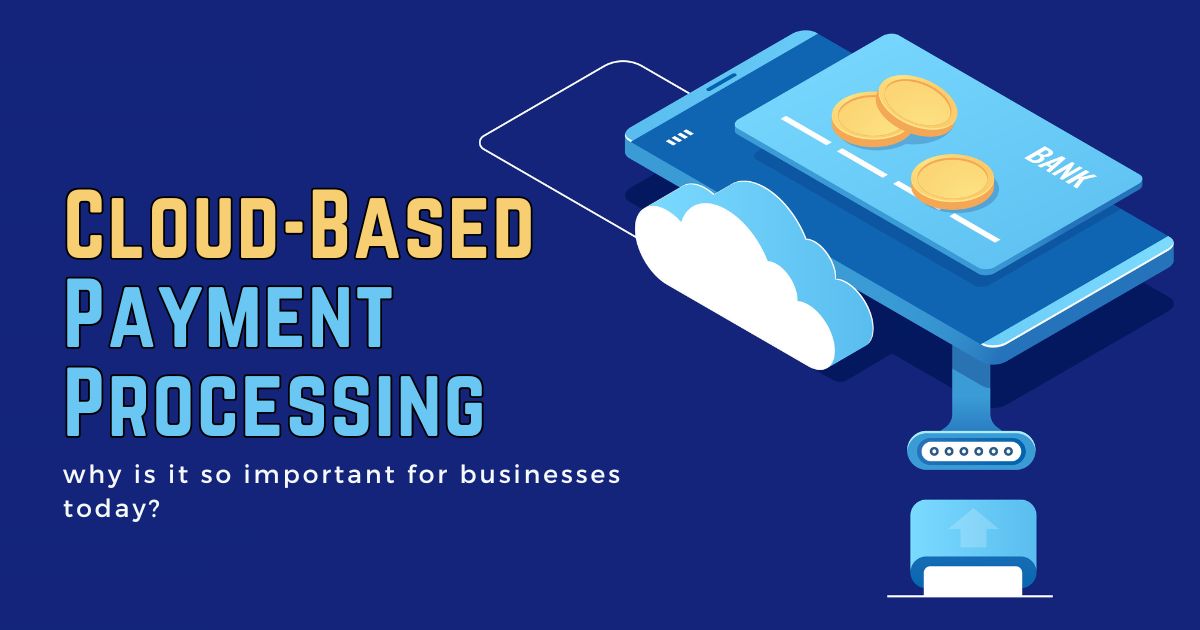
| April 29th, 2024 |
Cloud-Based Payment Processing — How It Works and Why Your Business Needs It?
In today’s digital world, where convenience and efficiency reign supreme, traditional payment processing methods are being rapidly replaced by more inventive and agile alternatives. One such solution that has gained popularity in recent years is cloud-based payment processing. But what is cloud-based payment processing, and why is it so important for businesses today?
Understanding Cloud-Based Payment Processing —
Cloud-based payment processing is fundamentally about using cloud computing technologies to enable and manage transactions securely over the internet. Unlike traditional on-premises systems, in which all hardware and software are housed on the company’s physical premises, cloud-based solutions make use of remote servers and internet-hosted networks.
This is how it works. Instead of relying on their own servers and infrastructure, businesses collaborate with third-party service providers who provide cloud-based payment processing solutions. These platforms manage many components of the payment process, such as authorization, authentication, settlement, and reconciliation, all from a secure and scalable cloud environment.
Key Components and Features —
Scalability:
One of the key benefits of cloud-based payment processing is scalability. Businesses may simply scale their payment infrastructure up or down in response to demand, without requiring substantial investments in hardware or infrastructure improvements. This flexibility is especially useful for organizations that experience seasonal variations or rapid expansion.
Security:
Security is a top consideration in payment processing, and cloud-based solutions provide strong security safeguards to safeguard sensitive payment information. Advanced encryption algorithms, tokenization, and secure data transmission protocols ensure that consumer information is protected throughout the transaction. Additionally, cloud providers follow tight compliance rules such as PCI DSS (Payment Card Industry Data Security Standard), which improves data security.
Accessibility:
Cloud payment processing allows organizations to access transaction data and analytics at any time and from any location. Businesses can gain important insights on the road by using web-based interfaces or mobile applications to monitor sales success, follow consumer behavior, or generate real-time reports.
Integration:
Cloud-based payment platforms are intended to work smoothly with other corporate systems and applications, such as accounting software, inventory management systems, and customer relationship management (CRM) tools. This integration streamlines operations, minimizes manual data entry, and improves overall efficiency.
Benefits for Businesses —
Cost Savings:
Businesses that use cloud-based payment processing can drastically minimize their initial capital expenses for infrastructure, software, and maintenance. Instead, customers pay a subscription or usage-based price, which allows for better budgeting and cost forecasting.
Enhanced Customer Experience:
Cloud-based payment processing offers customers a seamless and frictionless payment experience across various channels, including online, mobile, and in-store. Faster transaction processing, multiple payment options, and enhanced security measures contribute to improved customer satisfaction and loyalty.
Agility and Innovation:
Cloud-based solutions enable organizations to quickly respond to shifting market trends and consumer preferences. Cloud providers deliver continuous upgrades and feature enhancements, allowing businesses to stay ahead of the curve and exploit cutting-edge technology such as mobile wallets, contactless payments, and AI-driven fraud detection.
Global Expansion:
For organizations looking to enter international markets, cloud-based payment processing provides the scalability and flexibility required to enable cross-border transactions. Multi-currency support, localization capabilities, and compliance with regional rules enable smooth development into new markets.
Conclusion —
To summarize, cloud-based payment processing represents a paradigm shift in how businesses conduct transactions, providing unrivaled flexibility, security, and efficiency. Businesses that adopt cloud technology may future-proof their payment infrastructure, accelerate innovation, and provide excellent consumer experiences in today’s fast-paced digital economy. As the demand for seamless and secure payment solutions grows, investing in cloud-based payment processing becomes a strategic imperative for organizations that want to succeed in the next years.
